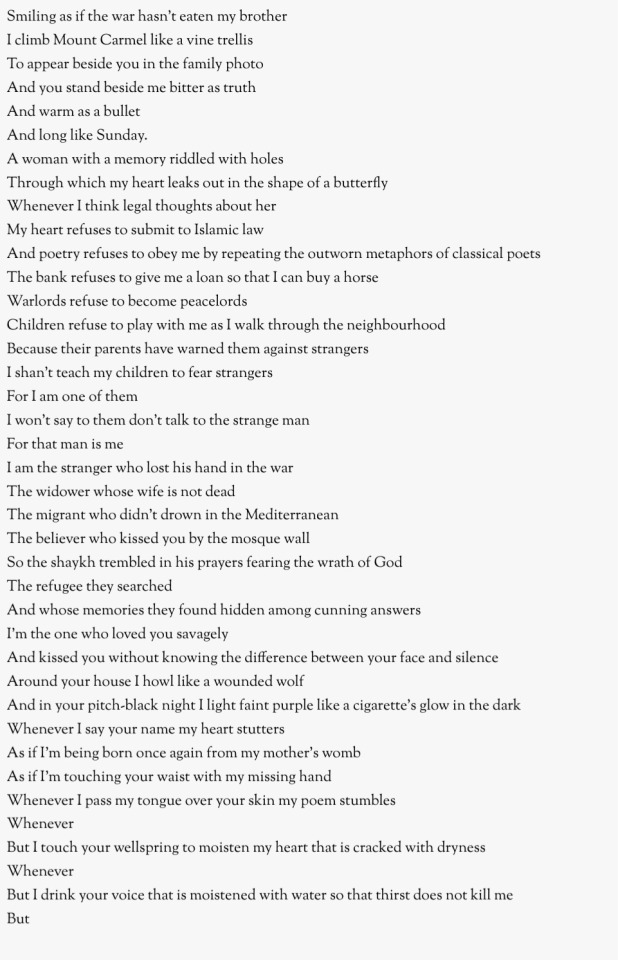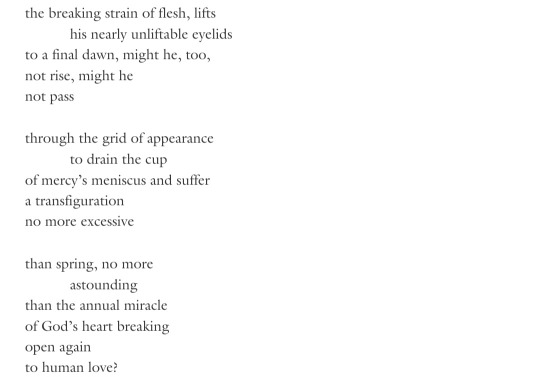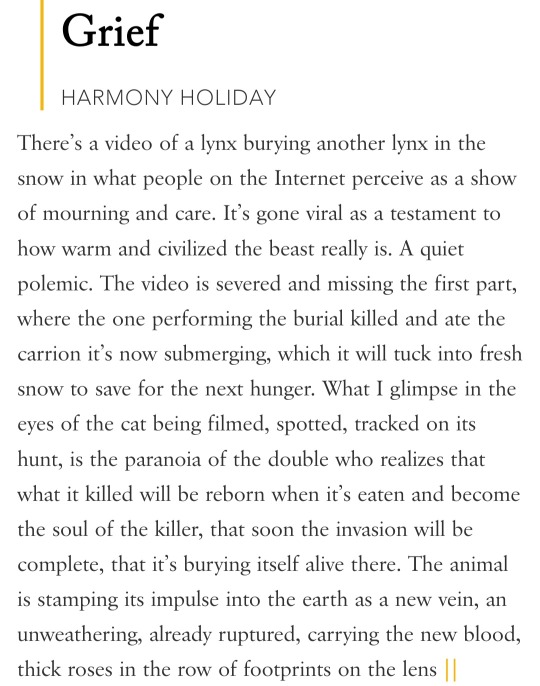Note
What are your core beliefs about God?
i don't have any. hope this helps.
#which isn’t to say i don't believe in god#just that i don't know what that means#wouldn't know how to talk about it and don't think talking about it is very important
31 notes
·
View notes
Text

Linda Gregg, from "According to the Hour", In the Middle Distance
44 notes
·
View notes
Text

Linda Gregg, In the Middle Distance
114 notes
·
View notes
Text

Ghayath Almadhoun, from "Black Milk", trans. Catherine Cobham
19 notes
·
View notes
Text
If someone is committed to a theory of productive forces—that is, if they believe that social change is generated solely through the advancement of forces of production—then they must also be committed to the subjective focus on purely economic struggle, because a practice in the workplace where the "bread and butter" rights of the workers who generate the forces of production (a portion of which is their own labour) will determine the velocity, direction, and meaning of those forces. Conversely, if one is committed to the perspective that struggles at the economic point of production are primary, then the logical upshot is that the labour output of these struggles (i.e., the forces of production now co-determined by workers' rights) is the political destiny, that one is struggling simply to perform better as a worker, and that this better performance will in some ways affect economic output. All of the other radical economistic assumptions (that economic struggle will produce a political consciousness, that unions will produce revolutionary parties, that agitation within traditional working-class spaces will become a gesture towards an insurrectionary general strike) are in fact incorporated within this productive forces comprehension where class itself becomes conflated with productive forces—a part of the speed of the train that is breaking the barriers of class contradiction. Accelerate the contradictions! But since when did contradictions possess a speed?
Moreover, some past Marxist-Leninist forces that ended up being hampered by the subjective instance of economism were theoretically opposed to the objective sense of the concept, refusing to accept that their practices valorized the very line they critiqued. It was only later, in theoretical assessments of the shortcomings of these movements, that the term "economism" (gleaned from Lenin and his critiques of the "Economists") was utilized, intentionally locating such practices in the realm of economic determinism. Such an assessment was motivated by the following problem: by treating economic sites of struggle as the primary focus, some organizations poured all of their energy into promoting their members' struggles in these sites so that such members would end up in positions of influence (in workplaces, union locals, overarching labour bodies), only to end up becoming functionaries subordinated to the vicissitudes of economic struggle (get a better contract, win the strike, prepare for the next round of bargaining, etc.), rather than militants focused first and foremost on the broader political struggle for socialism.
J. Moufawad-Paul, Politics in Command: A Taxonomy of Economism
21 notes
·
View notes
Text


hi is anyone else going to this thing
3 notes
·
View notes
Text


Ghayath Almadhoun, from "Black Milk", trans. Catherine Cobham
19 notes
·
View notes
Text




fishing adventures yesterday.
14 notes
·
View notes
Text
There's no cruelest month. I won't ascribe to that,
and--can I get a half hallelujah--not
every gone thing will rise again. If there's to be some new start
I can't choose to neglect how this whole rebirth thing works: Someone
help bury my dead god parts, or at least throw them in the sea.
Paula Cisewski, from "Superfoetation"
44 notes
·
View notes
Text

Linda Gregg, from "Marfa", In the Middle Distance
56 notes
·
View notes
Text
Holy Saturday provides a vocabulary consonant with the experience of a survivor. It is a place of alienation, confusion, and godforsakenness. But it is also a place that is continually covered over, dismissed, rendered unintelligible, and therefore subsumed under operative narratives of the progression of death to life. It is important to mark out this space pneumatologically for precisely these reasons. Attributing theological significance to the middle involves resisting the forward pull of the Christian narrative, from death to life. The middle suspends this forward movement and, in so doing, provides a necessary witness to the struggles of living in the persisting storm of the aftermath.
Shelly Rambo, Spirit and Trauma: A Theology of Remaining
83 notes
·
View notes
Text


Marjorie Stelmach, from "The Breaking Strain of Grace"
351 notes
·
View notes



